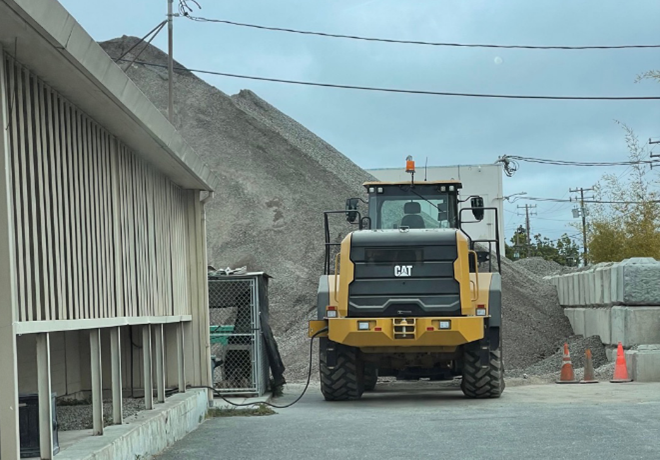EMPOWER Spotlight – Argent Materials
- EMPOWER
- Jul 10, 2025
- 3 min read
Updated: Jul 14, 2025

Key Facts
Workplace Location: Oakland, CA
Workplace Size: 38 employees (seasonal flux). Fleet of 20 heavy-duty vehicles and pieces of off-road equipment.
Type of Workplace: Regional concrete and asphalt recycling facility.
Charger Details:
Two L2 chargers at the main office for light-duty vehicles.
One L2 charger at the second equipment yard for off-road equipment.
Future Installations: A fourth L2 charger donated by East Bay Clean Cities will be installed at the main office for employee use in 2025. There are also plans for a potential fifth L2 charger which would be installed in the main yard for off-road equipment charging.
Program Details:
Argent Materials early commitment to carbon neutrality in 2017 has positioned them to test and champion sustainable transportation initiatives from transitioning renewable diesel (RD), testing and procuring a range of electrified medium- and heavy-duty equipment, and installing up to 5 Level 2 EV chargers by the end of 2025.
As employees gain hands-on experience with electrified equipment, both their comfort with the technology and their support for EV adoption have grown.
While EV charging is currently informally available to employees at no-cost, Argent is considering offering free workplace charging to all employees as a codified employee benefit. The L2 charger donated by East Bay Clean Cities will be installed exclusively for employee use.
Organization Background
Argent Materials, a leading regional concrete and asphalt recycler in Oakland, California, has emerged as a model for industrial sustainability through a forward-thinking and multifaceted approach to reducing its carbon footprint. The company’s journey began in 2017 when Argent led a transition to RD, a move that not only resulted in a third-party carbon-neutral certification from Ramboll but also addressed air quality and community health concerns. This decision was informed by California's supportive regulatory environment and state funding that covered half the cost, making the switch both environmentally beneficial and financially feasible.
Program Evolution and Growth
Building on this foundation, Argent turned its focus to electrifying its fleet of heavy-duty off-road equipment. This initiative was driven by owner Bill Crotinger’s confidence in EV technology, informed by over a decade of personal EV ownership. The company now operates an all-electric Volvo loader, a FirstGreen Industrial skid steer, and a Rizen Electric Dump Truck, and has tested a "game-changing" all-electric Caterpillar (CAT) loader. Recognizing the importance of supporting employee adoption, Argent is also considering codifying a workplace charging policy that allows all employees—seasonal and permanent—to charge their personal EVs at work for free. A dedicated Level 2 charger, donated by the East Bay Clean Cities Coalition in collaboration with the EMPOWER Project, will soon be installed to support this initiative.
Key to Argent’s success in electrifying the fleet of off-road equipment and expanding employee charging on-site has been proactive partnerships. The local utility, PG&E, provided support for the necessary grid upgrades required for charging infrastructure, while equipment manufacturers such as Volvo and CAT offered funding assistance and training. The East Bay Clean Cities Coalition, led by Richard Battersby, connected Argent to grant opportunities and technical resources, and a broad network of sustainable fleets. Collaborations such as these, helped Argent navigate the complexities of electrification and maximize available funding.
Best Practices and Lessons Learned
The project highlights several lessons for other industrial businesses seeking to reduce their carbon footprint. First, proactive and strategic partnerships—with utilities, manufacturers, and local Clean Cities and Communities coalitions—are essential for navigating the complexities of electrification. Reliable partners can provide guidance on maximizing state and local funding opportunities, which is critical to achieving electrification goals without financial strain, and the technical support necessary for a seamless transition for equipment operators.
Second, comprehensive electrification extends beyond vehicles at the worksite. Offering incentives for employees to charge their personal EVs facilitates the broader transition to cleaner fuels. Finally, community engagement is paramount. Argent has fostered goodwill by actively participating in neighborhood clean-ups and implementing procedures to minimize its local impact, proving that industrial businesses can be valued community partners. By starting with a clear vision and adapting through learning, Argent Materials has created a powerful model for holistic and sustainable industrial operations.




It's great to see companies like Argent Materials not only electrifying heavy-duty equipment but also offering charging for light-duty vehicles. This helps bridge the gap for employees and encourages broader EV adoption. Supporting both industrial and personal electric vehicles is a win for sustainability and workplace culture!